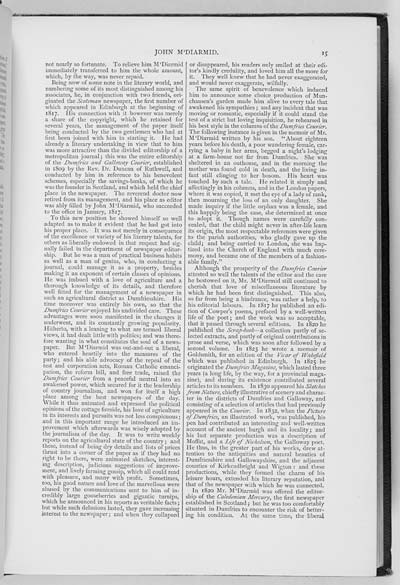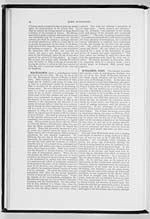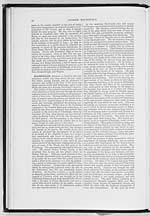15
not nearly so fortunate. To relieve him M 'Diarmid
immediately transferred to him the whole amount,
which, by the way, was never repaid.
Being now of some note in the literary world, and
numbering some of its most distinguished among his
associates, he, in conjunction with two friends, ori-
ginated the Scotsman newspaper, the first number of
which appeared in Edinburgh at the beginning of
1817. His connection with it however was merely
a share of the copyright, which he retained for
several years, the management of the paper itself
being conducted by the two gentlemen who had at
first been joined with him in starting it. He had
already a literary undertaking in view that to him
was more attractive than the divided editorship of a
metropolitan journal; this was the entire editorship
of the Dumfries and Galloway Courier, established
in 1809 by the Rev. Dr. Duncan of Ruthwell, and
conducted by him in reference to his benevolent
schemes, especially the savings-banks, of which he
was the founder in Scotland, and which held the chief
place in the newspaper. The reverend doctor now
retired from its management, and his place as editor
was ably filled by John M 'Diarmid, who succeeded
to the office in January, 1817.
To this new position he showed himself so well
adapted as to make it evident that he had got into
his proper place. It was not merely in consequence
of the excellence or variety of his literary talents, for
others as liberally endowed in that respect had sig-
nally failed in the department of newspaper editor-
ship. But he was a man of practical business habits
as well as a man of genius, who, in conducting a
journal, could manage it as a property, besides
making it an exponent of certain classes of opinions.
He was imbued with a love of agriculture and a
thorough knowledge of its details, and therefore
well fitted for the management of a newspaper in
such an agricultural district as Dumfriesshire. His
time moreover was entirely his own, so that the
Dumfries Courier enjoyed his undivided care. These
advantages were soon manifested in the changes it
underwent, and its constantly growing popularity.
Hitherto, with a leaning to what are termed liberal
views, it had dealt little with politics; and was there-
fore wanting in what constitutes the soul of a news-
paper. But M'Diarmid was out-and-out a liberal,
who entered heartily into the measures of the
party; and his able advocacy of the repeal of the
test and corporation acts, Roman Catholic emanci-
pation, the reform bill, and free trade, raised the
Dumfries Courier from a peaceful neutral into an
awakened power, which secured for it the leadership
of country journalism, and won for itself a high
place among the best newspapers of the day.
While it thus animated and expressed the political
opinions of the cottage fireside, his love of agriculture
in its interests and pursuits was not less conspicuous;
and in this important range he introduced an im-
provement which afterwards was wisely adopted by
the journalism of the day. It was to write weekly
reports on the agricultural state of the country; and
these, instead of being dry details and lists of prices
thrust into a corner of the paper as if they had no
right to be there, were animated sketches, interest-
ing description, judicious suggestions of improve-
ment, and lively farming gossip, which all could read
with pleasure, and many with profit. Sometimes,
too, his good nature and love of the marvellous were
abused by the communications sent to him of in-
credibly large gooseberries and gigantic turnips,
which he announced in his reports as veritable facts;
but while such delusions lasted, they gave increasing
interest to the newspaper ; and when they collapsed
or disappeared, his readers only smiled at their edi-
tor's kindly credulity, and loved him all the more for
it. They well knew that he had never exaggerated,
and would never exaggerate, wilfully.
The same spirit of benevolence which induced
him to announce some choice production of Mun-
chausen's garden made him alive to every tale that
awakened his sympathies; and any incident that was
moving or romantic, especially if it could stand the
test of a strict but loving inquisition, he rehearsed in
his best style in the columns of the Dumfries Courier.
The following instance is given in the memoir of Mr.
M'Diarmid written by his son. "About eighteen
years before his death, a poor wandering female, car-
rying a baby in her arms, begged a night's lodging
at a farm-house not far from Dumfries. She was
sheltered in an outhouse, and in the morning the
mother was found cold in death, and the living in-
fant still clinging to her bosom. His heart was
touched by such a tale. He related it simply and
affectingly in his columns, and in the London papers,
where it was copied, it met the eye of a lady of rank,
then mourning the loss of an only daughter. She
made inquiry if the little orphan was a female, and
this happily being the case, she determined at once
to adopt it. Though names were carefully con-
cealed, that the child might never in after-life learn
its origin, the most respectable references were given
to the parish authorities, who gladly gave up the
child; and being carried to London, she was bap-
tized into the Church of England with much cere-
mony, and became one of the members of a fashion-
able family."
Although the prosperity of the Dumfries Courier
attested so well the talents of the editor and the care
he bestowed on it, Mr. M'Diarmid still continued to
cherish that love of miscellaneous literature by
which he had been first distinguished. This also,
so far from being a hindrance, was rather a help, to
his editorial labours. In 1817 he published an edi-
tion of Cowper's poems, prefaced by a well-written
life of the poet; and the work was so acceptable,
that it passed through several editions. In 1820 he
published the Scrap-book�a collection partly of se-
lected extracts, and partly of original contributions in
prose and verse, which was soon after followed by a
second volume. In 1823 he wrote a memoir of
Goldsmith, for an edition of the Vicar of Wakefield
which was published in Edinburgh. In 1825 he
originated the Dumfries Magazine, which lasted three
years (a long life, by the way, for a provincial maga-
zine), and during its existence contributed several
articles to its numbers. In 1830 appeared his Sketches
from Nature, chiefly illustrative of scenery and charac-
ter in the districts of Dumfries and Galloway, and
consisting of a selection of articles that had previously
appeared in the Courier. In 1832, when the Picture
of Dumfries, an illustrated work, was published, his
pen had contributed an interesting and well-written
account of the ancient burgh and its locality; and
his last separate production was a description of
Moffat, and a Life of Nicholson, the Galloway poet.
He thus, in the greater part of his works, drew at-
tention to the antiquities and natural beauties of
Dumfriesshire and Gallowayshire, and the adjacent
counties of Kirkcudbright and Wigton : and these
productions, while they formed the charm of his
leisure hours, extended his literary reputation, and
that of the newspaper with which he was connected.
In 1820 Mr. M'Diarmid was offered the editor-
ship of the Caledonian Mercury, the first newspaper
established in Scotland; but he was too comfortably
situated in Dumfries to encounter the risk of better-
ing his condition. At the same time, the liberal

![]() Universal Viewer |
Universal Viewer | ![]() Mirador |
Large image | Transcription
Mirador |
Large image | Transcription
![]()

